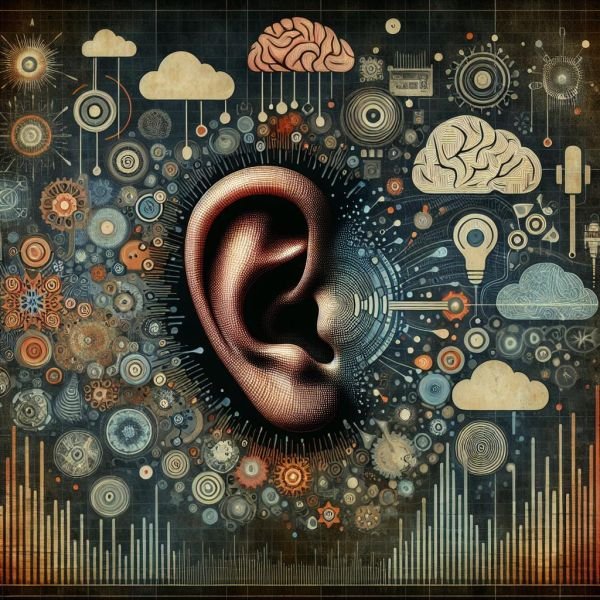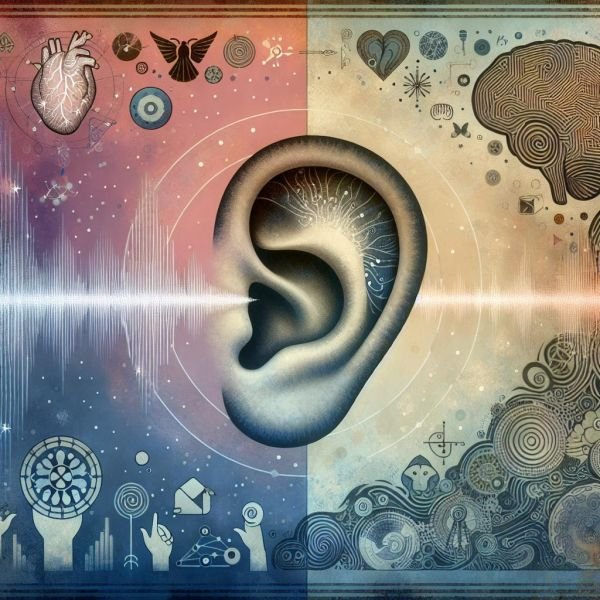In a world increasingly characterized by sounds—the gentle rustle of leaves, the laughter of loved ones, the comforting hum of everyday life—there exists a silent struggle that often goes unnoticed: the impact of hearing loss on mental health. As auditory connections fade, the invisible thread that links us to our surroundings may become frayed, giving rise to feelings of isolation, depression, and anxiety. This article delves into the intricate relationship between hearing loss and mental well-being, exploring how a diminished ability to hear can influence emotional resilience and social interaction. By uncovering the psychological ramifications of auditory decline, we hope to illuminate the importance of addressing hearing health as a critical component of holistic mental wellness. Through this exploration, we seek to foster a deeper understanding of the intertwined pathways of hearing and mental health, encouraging both awareness and compassion for those navigating these challenges.
Understanding the Link: How Hearing Loss Impacts Mental Health
Hearing loss can considerably alter the way individuals interact with their habitat and the people around them, frequently enough leading to emotional and psychological challenges. Research shows that those who experience hearing impairments are at a higher risk of conditions such as depression and anxiety. This link arises as difficulties in communication can lead to feelings of isolation and frustration. Without the ability to fully engage with conversations and social settings,individuals may withdraw from relationships,exacerbating their feelings of loneliness.
Furthermore, the cognitive load of trying to understand speech in noisy environments can be overwhelming. As the brain struggles to process sounds that are either muted or distorted, it can result in mental fatigue. Some of the most common impacts include:
- Increased stress levels: the constant effort to hear and interpret data can be exhausting.
- Social withdrawal: Avoiding social situations due to difficulty hearing can lead to disconnection.
- Cognitive decline: Prolonged isolation and inactivity may speed up cognitive deterioration.

the Emotional Toll: Exploring Anxiety and Depression in individuals with Hearing Loss
The impact of hearing loss extends far beyond the physical challenges of communication, frequently enough leading to profound emotional distress. Individuals experiencing hearing loss may find themselves grappling with a heightened sense of isolation, as social interactions become increasingly daunting. This struggle can foster feelings of inadequacy and frustration,leading to notable emotional tolls such as:
- Anxiety: The fear of misunderstanding or being misunderstood can create a perpetual state of worry.
- Depression: The sense of isolation may evolve into persistent feelings of sadness, withdrawing from social circles.
- Low Self-Esteem: Experiences of miscommunication can erode confidence in social settings.
- Frustration: The constant need to repeat oneself or ask for clarification can be exhausting.
Interestingly, research indicates a cyclical relationship between hearing loss and mental health. The emotional burdens often amplify the challenges posed by hearing impairment, creating a negative feedback loop. This means that as anxiety and depression intensify, the ability to adapt to hearing loss becomes increasingly hindered. A closer look at how these factors interact can be framed in the following table:
| Emotional Impact | Effects on Hearing |
|---|---|
| Anxiety | Increased avoidance of social situations |
| Depression | Reduced motivation to seek help or use hearing aids |
| Low Self-Esteem | Desire to withdraw from conversations |
| Frustration | Increased communication breakdowns |

Bridging the Gap: Strategies for Improving Communication and Social Connections
Effective communication is essential for maintaining mental well-being, especially for individuals with hearing loss. Implementing simple strategies can significantly enhance the quality of interactions. Consider the following methods to create a more inclusive and supportive communication environment:
- Utilize visual aids: Incorporate gestures, facial expressions, and written messages to clarify meaning.
- Speak clearly: Use a moderate pace and enunciate words to facilitate better understanding.
- Limit background noise: Choose quiet settings for conversations to minimize distractions.
- Encourage feedback: Prompt individuals to repeat or summarize what they’ve understood to ensure clarity.
Building strong social connections is equally critical for mental health. social support can alleviate the feelings of isolation frequently enough experienced by those with hearing impairments. Here are several approaches to foster community ties:
- Participate in support groups: Engage with others facing similar challenges to share experiences and coping strategies.
- Organize social events: Create opportunities for group activities, which can include games or outings focused on accessible communication.
- Leverage technology: Promote the use of communication apps or devices that facilitate easier conversations.
| Strategy | Description |
|---|---|
| Visual Communication | Incorporating methods such as sign language or written text for clearer exchanges. |
| Community Engagement | Building relationships through gatherings and support networks that provide social interaction. |

Empowering Change: Recommendations for Mental Health Support and Hearing Rehabilitation
To address the intricate link between hearing loss and mental health, a multifaceted approach is essential. Mental health support can be significantly enhanced by increasing awareness and reducing stigma surrounding hearing loss.This can be achieved through community programs that educate the public on the impact of hearing impairments on psychological well-being. Additionally, mental health professionals should receive training to recognize signs of hearing loss and understand its effects on emotional health.It’s crucial to foster an environment where individuals feel pleasant discussing both their hearing and mental health challenges, thus promoting a more integrated and supportive community.
Furthermore, hearing rehabilitation must prioritize holistic strategies that blend audiological services with mental health support. Recommendations include:
- Audiology screenings during mental health assessments to identify potential hearing impairments early.
- Cognitive behavioral therapy (CBT) tailored to address the frustrations often linked to hearing loss.
- Support groups where individuals can share experiences and coping strategies, fostering a sense of belonging and understanding.
- Accessible resources, such as informational sessions and handouts that explain both hearing loss and its implications on mental health.
In Conclusion
as we navigate the intricate tapestry of our senses, it becomes evident that the threads of hearing and mental health are closely intertwined. The journey of understanding how hearing loss can influence emotional and psychological well-being is not merely a matter of science; it’s a profound exploration of the human experience.
In this interconnected world, acknowledging the impact of auditory challenges on mental health is paramount. From fostering awareness to promoting accessibility, there is much we can do to bridge the gaps that isolation and misunderstanding can create.Advocating for hearing health is not just about preserving sound; it’s about nurturing connections, enhancing communication, and ultimately enriching lives.
As we conclude, let us remember that each voice matters and every story has the power to echo far beyond the confines of sound. By embracing a holistic approach to hearing loss and mental health, we can cultivate a more inclusive society where everyone has the opportunity to thrive—both in mind and spirit. Together, let’s create an environment where all voices can be heard, and with that, a better understanding of ourselves and those around us can flourish.
